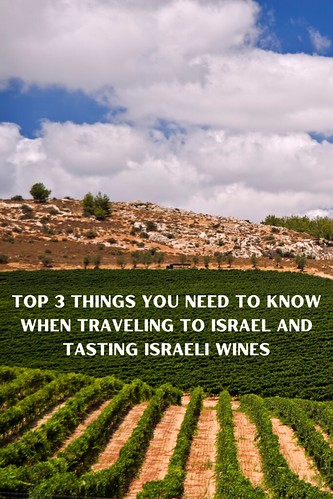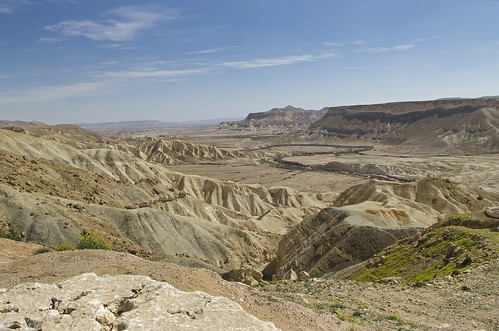Top 3 Things You Need to Know When Traveling to Israel and Tasting Israeli Wines
Since biblical times, Israel has been engaged in the manufacture of wine. It is currently the only country in the Middle East to do so commercially and professionally.
Before the modern era—and we are talking about two thousand years ago—wine production in Israel was primarily for religious rites, with quantity being more essential than quality. Because of several military occupations, the industry never entirely took off until the end of the nineteenth century, experiencing ups and downs (and even disappearance) along the way.
Until the end of the nineteenth century, the industry truly began to function on a consistent and steady basis. Edmond de Rothschild was the driving force behind this revival. He founded the Carmel Winery, Israel's largest wine producer, who produces more than a million cases of wine each year, sells to 40 countries, and accounts for nearly half of Israel's wine production.

Wine Regions in Israel
The Galilee, the Judean Hills, Samson, the Sharon Plain, and the Negev are just a few of the wine-producing regions in the world, which are distinguished by their weather and terroir conditions.
More than half of Israel’s crop is earmarked for red wine, with the remainder going to white wine and only a tiny amount going to rosé wine.
While most of the vineyards are currently planted with French grapes, such as Cabernet Sauvignon, Syrah, Mourverdre, Chardonnay, Viognier, and others, local winemakers are collaborating with wineries to produce wines made from indigenous grapes, such as Marawi, Bittuni, and Dabuki, among others, intending to recreate in some way the wines that were so highly prized in the ancient world…and forging a bond with the people of Israel.
These 3 wine-producing regions dominate the market according to production:
The Galilee
The Galilee is Israel's northernmost and, in many eyes, best-known appellation. The Golan Heights are the highest-quality territory within the appellation, and they are also the coldest region of Israel.
The Golan Heights, a harsh, hilly country topped by the peaks of Mount Hermon, is home to one of Israel's most coveted wines, which is produced in the region's vineyards. It is marketed by a number of wineries, the most prominent of which is Golan Heights Winery, which was established in 1983 and produces six million bottles of wine per year.
Golan Heights wines are "kosher" (pure, acceptable), and they are produced in compliance with Jewish religious guidelines that have been approved by a rabbi in accordance with the Jewish faith. For example, only a Jew is allowed to touch and press the grapes, and the vine must be at least four years old before this can happen.

The Judean Hills
This region is noted for the largest number of boutique wineries in Israel, such as Domaine du Castel, located in Ramat Raziel. With more than 20 vineyards in the area, each one has a unique narrative to tell about wine.
Wine grapes grown in the Judean Hills are grown in red clay or limestone soil. Temperature differences between day and night allow the grapes to preserve their acidity and freshness while ripeness and flavor are maximized on hot, sunny days.

The Wine Route Through The Negev Desert of Israel
The Negev Desert, like most deserts, is mainly associated with sand, rock, and the occasional camel. However, even though it appears to be parched and dry, this region in southern Israel is home to various wineries. During the last few years, winemakers have transformed Negev's slopes into a miniature version of Napa Valley.
You can visit 9 out of the 12 wineries that can be found along the trails, which undoubtedly helps to breathe new life into the area's tourism industry as a whole.
Because these wineries are distributed throughout the Negev (mainly between the cities of Be'er Sheva and Mitzpe Ramon) and that public transit is limited, traveling by private automobile or on a guided tour is the most convenient method to see the region. It is best to take your time and travel slowly through the Negev to fully appreciate its distinct and serene ambiance.

The Kosher Wine
For a wine to be considered kosher, Jews who observe the Sabbath must be involved in every step of the process, from harvesting the grapes through bottling. Yeasts and fining agents, as well as any other components, must all be kosher.
Some kosher wines are treated in a method known as Mevushal, which translates as "cooked" in Hebrew. A more concentrated flavor is achieved by heating the must (grape juice) ahead to fermentation in certain wineries' production of Mevushal wines, while doing so in others' after bottling.
When kosher wine is made, marketed, and sold commercially, it will be labeled with the kosher certification provided by a professionally trained rabbi who will be in charge of the supervision from beginning to end of the production process.
Not all Israeli wines are kosher, as some may believe. Even though only roughly 30% of Israeli wine brands are certified kosher, these kosher wineries account for more than 90% of the country's total wine production.
The Bottom Line
When traveling to another country, the most important thing to remember is that the most significant thing to see is not monuments or beautiful scenery, but instead getting to know the people and their culture in the place you are visiting.
Consuming the most innovative dishes of the region's gastronomy becomes a part of the traveler's culture, and becomes something necessary that also enriches the overall experience of your journey in this regard. In addition, it’s essential also to taste its wines.
Israel's wine culture is deeply ingrained; it is not essential to be a wine expert to take part in an enotourism trip to visit wineries and enjoy a delicious glass of wine.

-

- Log in to post comments


















